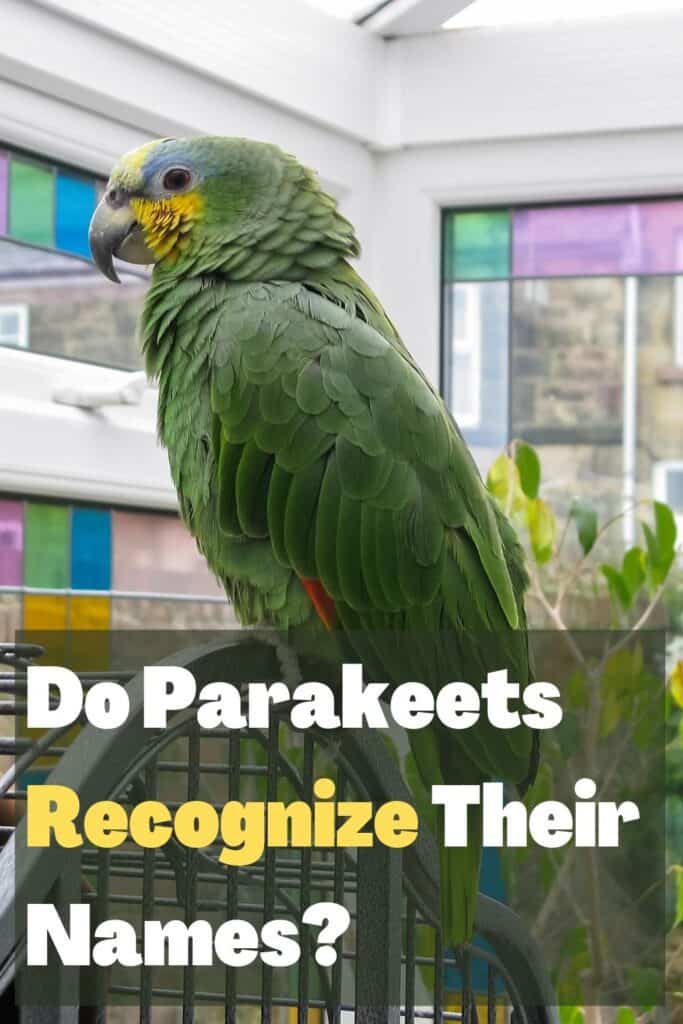A name is a critical connection tool amongst social species. We even name our pets. Your parakeet, for instance, might be a Meryl Cheep. However, can Meryl recognize her name? Can Meryl learn her name and that of other parakeets? Can two budgies communicate to each other and is it by name even if it isn’t in spoke words.
Yes, Many birds including parakeets can learn to recognize their names. It is not an instant reaction or instinct but it can be taught. Through constant repetition of calling their name, they will slowly learn to recognize the sound. You will see a reaction like tail bobbing, swaying and squawking once they start to recognize their own names when called.
Table of Contents
Can parakeets recognize their names?
When humans use names, they can do much more with them. You can, for instance, go “Hi Joe, let’s have coffee later”. You can use a name to spark a conversation. It would amaze if parakeets can do this, right? According to studies by Karl Berg, a scientist, parrots in the wild do not merely peep and chirp.
Karl Berg’s research shows that when these birds chirp, they are not just making a lot of noise but having conversations amongst themselves. Karl, who has studied the conversational habits of the green-rumped parrotlet in Venezuela, says that these adorable birds use distinct peeps for their identity.
Baby parrots will learn to peep their parents and sibling’s names and also how to use their name peeps in conversations. So yes, Merly Cheep can ask, “Are you that same Dino I met by the water fountain”?
Parrots and parakeets may have slight differences, but budgerigars commonly referred to as parakeets in the United States are a species of parrot native to Australia.

The very intelligent bird
So who gives names to parakeets in the wild? How do they identify and learn their signature peep? Is it a feature encoded in their genetic pool, or is it a learned habit?
Berg believes that budgie parents name their little chicks, just as humans give names to their babies. Young parakeets in the wild learn how to vocalize their names during infancy.
More research has now also brought to light the fact that your budgie is more of a clever boy than you ever imagined him to be. Studies show that your parakeet pet can comprehend simple words as well as a 7-month human baby can.
While birds have relatively small brains, compared to that of larger mammals, they have disproportionately high levels of intelligence.
Therefore, while the world has long assumed that birds are simple of mind, they are bright. This discovery takes away much sting from the insult ‘birdbrain’. Our adorable little friends cannot only recognize simple words but can pick up patterns in speech; an attribute thought to be uniquely human.
Your tiny green or blue buddy does not only mimic human speech but understands specific patterns in phrases and language. This makes birds, the first animals, besides humans, to grasp low levels of grammar.
Studies by the University of Leiden researcher shows that the brains of a parrot or songbird are bigger relative to their body size. These birds can vocalize by imitation better than other bird species.
How do parakeets in captivity learn their names?
Like any parakeet owner, you know the biggest joy of owning this cute pet is watching it learn how to talk. You will need to spend hours on end on its training, but the fact is that parakeets can vocalize many human words.
All you need to do is to train them, and by the unique advantage of their genius, they will over time learn to voice their name.
Your avian friend belongs to one of the most vocal species in the parrot family. It will tweet and make sounds because it is a highly social animal. When in the wild, the budgie will find its place in a large flock, spending most of its time hunting for food, water, nest sites, and mates.
It will also care for its offspring and teach them how to recognize their names, as Karl Berg’s research suggests.
These birds also massively communicate with each other within a flock. They will sing when healthy and in a good mood, sounding of budgie melodies. In captivity, they will copy sounds from their environment and human speech.
The cheery budgie will mimic music, other pets, your phone’s ringtone, and other wild bird noises and produce creative melodies from them.
They will also scream when grumpy, scared, or uncomfortable. The parakeet can vocalize and recognize its name if you teach them to do so patiently. These birds may not have the speech prowess of the African grey parrot, but their skills are impressive.

How to teach a parakeet to recognize its name
One key factor you have to remember when teaching you parakeet its name is that in captivity, your bird will make the sounds it hears most often. Therefore, you risk having a budgie that meows, if it spends most time in the company of a cat.
The bird will attempt to bond with you and your family by trying to communicate as if it was talking to a fellow parakeet.
Vocalizing words will meet its desire to fit in its human family. Thus, your bird is already willing to learn the ways of your people, which should make your work a lot easier.
Secondly, these birds learn languages through exposure. Consequently, the budgie may vocalize the name you give him or her, but not expressly grasp the meaning of the name or words.
They also do not have vocal cords, so they make sounds via their airways and beak. Your feathered friend might be more intelligent than most other birds, but the most that he can do is to repeat sounds or words from his pet parent.
However, it is possible to teach them how to recognize and respond to the tag you give them via hand gesture or triggers since they can identify patterns in words. Below is a process that you can use to teach your parakeet their name.
- Begin teaching them their name when they are at their happiest and healthiest. If your budgie is sad, lonely, or sick, they will not be in any mood to learn a thing from you. A happy budgie is a ball of energy and will sing often.
- Speak to your bird early in the morning when their minds are most fresh. They will easily memorize the name you give them during this hour. Feed them first to make them comfortable and receptive to learning.
- Teach them a simple word first. Your budgie does not have a larynx, so it cannot pronounce heavy words. Pick a name that a young child can say with ease. Avoid names that have many syllables. A resonant, simple name is the best for a parakeet.
- Limit the words you want them to learn. Parakeets will learn consonants effortlessly. As an illustration, teach them one word over a seven to eight weeks period.
- Reward your buddy when he makes progress. You can give them a new toy or fruit bits to reinforce exemplary behavior.
- Be consistent with your bird’s education; remind them their name every morning and show joy when they vocalize their name. They will be more enthusiastic when they see you happy and make more budgie sounds for your pleasure.
Conclusion
Parakeets enthusiasts say that these birds learn faster when they have a powerful bond with their owner. If your bird fears you, he or she will not attempt to communicate with you. So, build a relationship and start teaching them their name at the earliest age possible.




